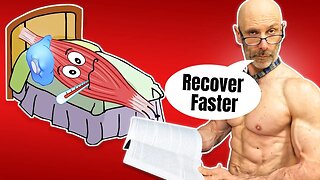Premium Only Content

Best High Protein Foods For Building Muscle Mass
Best high protein foods for building muscle mass
For food to qualify as an excellent high protein mass builder, it needs to meet specific criteria. Not only does it need to be high in protein, but it has to be easily digestible. This is even more important as we get older, with it becoming more difficult to digest protein with age.
Next, we want it to have all of the essential amino acids. There is a workaround for this when it comes to nonmeat protein sources, but we will get to that later.
There is one amino acid that is more anabolic than the others, and that is Leucine. So we want something that has a decent amount of this amino acid.
If you are interested in losing body fat and adding muscle, please email me at 1shark1bite@gmail.com for information on my personal training services.
Facebook; https://www.facebook.com/Fit-and-50-548844435514900/
My Amazon page link; https://www.amazon.com/shop/fitand50
My Affiliate link to Lebert for their Equalizer bars and more; http://www.easywebautomation.com/app/?af=1679568 and use the discount code LFI20 you will receive 20 dollars off your purchase
To establish the digestibility of a protein in food, I looked at the protein digestibility corrected amino acid score, which is used to evaluate protein quality. At the top of the list, we have milk and the milk proteins whey and casein, eggs, and soy protein isolate. All of these have a perfect score. Shrimp also has a perfect score, but I had to do some additional research on this as it is not found on most standard lists.
Just below this top group, we have chicken, beef and soy.
To clarified this score was set up to provide insight into the minimum amounts of nitrogen and amino acids needed to prevent whole-body protein deficiency, not to rank a food's potential to maximally stimulate muscle protein synthesis.
Studies have shown that beef is superior to soy in stimulating muscle protein synthesis, and the same is true with whey protein compared to soy protein isolate.
Plant sources of proteins contain anti-nutrients, which, as the name implies, can interfere with the absorption of certain nutrients. These get removed when being made into a protein powder like soy protein isolate or a pea protein concentrate, improving its effectiveness in stimulating muscle protein synthesis.
As a side note, most of the phytoestrogens that are in soy are removed during this process. There is a back and forth on whether or not they are harmful to our testosterone levels. But from my standpoint, less is better.
When it comes to amino acids, animal sources contain a superior blend of essential amino acids, which are the ones our body can’t make. To get the required amino acids from a plant-based diet, it's important to eat from a wide variety of foods.
The two amino acids that aren’t found together in sufficient quantities are lysine and methionine. Foods that are higher in lysine are legumes like beans and peas. With grains like oats and rice as well as seeds like pumpkin and sunflower being higher in methionine.
Even with meat products, it’s good to eat from a variety of different sources. Lean beef has b vitamins, minerals and creatine.
Greek yogurt has a mix of fast and slow-digesting proteins. Most of the protein is casein, which digests slower, making it a good choice before bed to allow for a slow continuous release of protein throughout the night.
Fish like salmon are high in protein and contain omega 3 fatty acids, which provide many health benefits, including improving muscle function.
I did a video on eggs not too long ago, so I’ll leave a link to that video in the comments.
Shrimp is almost all protein and contains a high amount of leucine, the most anabolic of the amino acids.
While essential amino acids like leucine are found in greater amounts in animal sources, there is evidence to support that all one needs to do to get the equivalent response from plant sources is to ingest more of them.
Young men need about 20g of whey protein to maximally stimulate muscle protein synthesis post-workout.
They did a study and found after an 8-week training program with the subjects taking 48g of rice protein or the equivalent amount of whey protein resulted in a similar increase in lean body mass. Another study using 33g of soy protein had a comparable result. Indicating eating greater amounts of plant-based protein will bring about a similar effect to animal-based.
Older adults require more protein to stimulate muscle protein synthesis fully. I couldn’t find a study indicating a recommended amount of a plant-based protein to take post-workout, but we know it’s 40 grams for whey protein. So if you are going to use a plant-based protein powder, I would recommend you use a serving size greater than this.
https://academic.oup.com/jn/article/145/9/1981/4585688
https://www.researchgate.net/publication/287283789_Shrimps_-_a_nutritional_perspective
-
 4:53
4:53
Fit and 50
1 year ago $0.07 earnedHow to Speed Up Muscle Recovery Over 50 (Recover Like a 20 yr old)
5004 -
 LIVE
LIVE
Tate Speech by Andrew Tate
8 hours agoEMERGENCY MEETING EPISODE 92 - IN THE TRENCHES
99,804 watching -
 DVR
DVR
In The Litter Box w/ Jewels & Catturd
20 hours agoThe Trump Effect | In the Litter Box w/ Jewels & Catturd – Ep. 696 – 11/21/2024
13.5K12 -
 20:53
20:53
SLS - Street League Skateboarding
2 days agoGold Medals, World Class Food, Night life & more - Get Lost: Tokyo
1.29K -
 47:13
47:13
PMG
16 hours ago"Hannah Faulkner and Doug Billings | WHY LIBERALS LOST THE ELECTION"
252 -
 59:01
59:01
The Liberty Lobbyist
3 hours ago"We Only Have NOW To Make a Difference"
140 -
 DVR
DVR
CatboyKami
4 hours agoStalker 2 Blind playthrough pt1
551 -
 1:06:27
1:06:27
Russell Brand
4 hours agoNeil Oliver on the Rise of Independent Media, Cultural Awakening & Fighting Centralized Power –SF498
144K199 -
 1:39:14
1:39:14
vivafrei
4 hours agoSoros Karma in New York! Tammy Duckwarth Spreads LIES About Tulsi Gabbard! Pennsylvania FLIPS & MORE
63.2K55 -
 1:57:36
1:57:36
The Charlie Kirk Show
4 hours agoInside the Transition + The Bathroom Battle + Ban Pharma Ads? | Rep. Mace, Tucker, Carr | 11.21.24
114K49